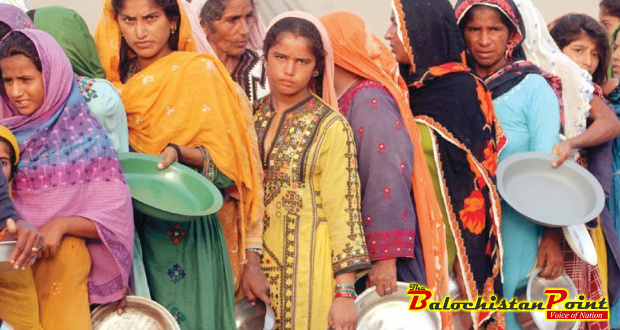Adnan Aamir
October 16 is globally celebrated as World Food Day. This day is celebrated to raise awareness about food security. On this day this year, Balochistan is facing an acute food insecurity issue. Drought is taking its toll on the province and problems are further compounded by the incompetence and bad governance of the provincial government.
According to data provided by Sustainable Development Policy Institute (SDPI), 30 out of 32 districts of Balochistan are food insecure. Only Quetta and Jaffarabad districts have food security in the entire province. The source of food is agriculture, and in Balochistan this sector has been badly affected due to shortage of water.
Over 80% of the agricultural land of Balochistan is rain fed, and in the last couple of years there has been less rainfall than normal. Rain water collected in rivers is not utilized properly either, due to bad management. In Khuzdar district alone, 350,000 cusecs of water are dumped through 5 rivers in Arabian Sea every year. Not a single large dam has been built in Balochistan in recent years to store rain water, and as a result the water table is falling sharply.
The remaining part of the agricultural land is irrigated using water supplied through tube wells which requires electricity to function. Rural Balochistan doesn’t get more than four hours of electricity on a daily basis and this has pulverized agriculture in the province. As a result, the hazard of food insecurity has increased.
Drought-like conditions in Balochistan were predicted last year. Droughts in the province have always been very devastating for people and livestock. The last devastating spell of drought in Balochistan continued from 1997 to 2005. According to modest estimates, over 1.76 million cattle died; an area of 0.798 million hectares remained uncultivated and provincial exchequer bore a loss of Rs. 25 billion, due to that drought. This time around the affect of drought will be much greater due to the increase in population and deterioration in capacity of government machinery to conduct relief work.
Apart from the natural disadvantage, bad governance is also contributing to the food insecurity in the province. In September last year the government declared 29 out of 32 districts of Balochistan as drought affected areas. The chief minister announced a package of Rs. 1 billion, which was to be used for the relief of drought victims. Over a year has passed and not a single penny from that package has been spent. Whether that package is still stuck in the bureaucratic red tape or funding has been curtailed, it’s not known. What is known is the fact that it’s not a priority of the incumbent Balochistan government to take any urgent steps to mitigate the loss of the ongoing drought.
Furthermore, there are serious flaws in the working and structure of the agriculture department of Balochistan. The department is one of the largest in the province with employees totaling over 16,000 in number. This department is overstaffed and extra people have been recruited in it for political reasons. It has six wings and one them is Agriculture Extension. This wing alone has 586 Agriculture Officers and over 1,000 field assistants. An overwhelming majority of these officers and assistants do nothing and receives their salary while sitting at home. This is just a tiny example of what’s wrong with the department and overhauling it is not on the agenda of the provincial government.
In this context, there are a lot of things that need to be done to improve the situation and prevent a human catastrophe. The first thing that should be done is to restructure the agriculture department. All the people recruited on political basis can’t be dismissed, so the government must ensure that they perform their duties. Job structures should be modified and the workload of the employees should be increased. The 16,000 strong workforce of agriculture department should be used to make agriculture practices successful even in inhospitable conditions. This daunting task requires political will and a farsighted approach, which the current government has not yet displayed through any of its actions.
At the moment, the Balochistan government is using an agriculture policy which was enforced in 1996. This policy is outdated and incapable of addressing the growing problems in the province. A new and updated agriculture policy is the need of the hour and the government should work on it on urgent basis.
International organizations should be convinced by the Balochistan government to increase the funding in the drought affected areas. The government can take the help of experts from Food and Agriculture Organization to chalk out plans on how it can make the entire province food secure.
Reforms in agriculture sector and relief efforts in drought affected areas would require a lot of funds. The Balochistan government doesn’t have any spare funds for these needed projects due to fiscal mismanagement and corruption. The provincial government has to set its house in order and needs to make efficient use of its resources.
Expenditure on reforms in agriculture is pivotal because it deals with providing food to the population of the province. Rather than wasting money on political gimmicks such as educational emergency, Balochistan government should allocate resources for agriculture to end food insecurity in the province.
Courtesy: The Nation
Published in The Balochistan Point on October 21 2015
Disclaimer: Views expressed in this article are those of the author and The Balochistan Point not necessarily agrees with them.
 Balochistan Point Voice of Nation
Balochistan Point Voice of Nation




